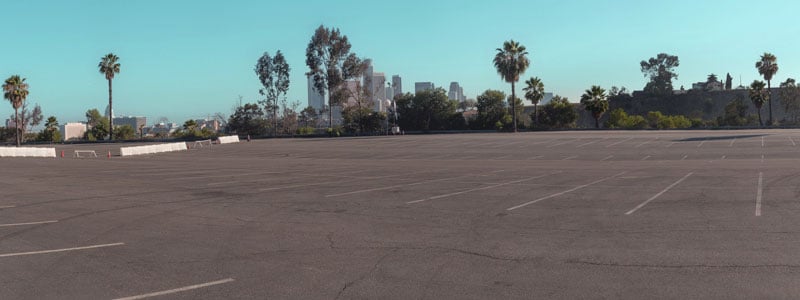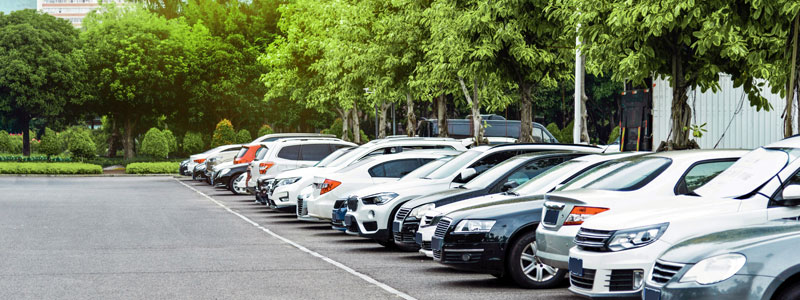Everyone knows that real estate is one of the most reliable forms of passive income. Property investments rarely see a depreciation in market value over time, whether you’re investing in residential, commercial, or even empty properties. Buying vacant lots as passive real estate investing is, in fact, one of the safest bets in the industry because the value lies in its potential. There’s no kitchen that might become outdated or roof to sag over time. A vacant lot holds all the inherent value of the land and location with none of the risks associated with choosing a type of property with specific features that may go out of style or decay.
You can even put a vacant lot to use, collecting a modest income from your investment by making it available to others for activities like camping, events, or even rented parking through an app like Neighbor without committing to any serious changes to the land. Making it a great, low-risk option for new investors.
Real estate investment is a proven path to building wealth, and one of its hidden gems is investing in vacant land. This article will reveal the potential of vacant land investment, touching on its pros and cons, and offering eight compelling reasons why it’s a worthwhile addition to your investment portfolio.
Why Vacant Land is a Worthwhile Investment
When it comes to real estate investment, vacant land is often overlooked. Yet, it offers inherent value and vast potential with potential for a faster return on investment. Its benefits range from lower costs and maintenance to high appreciation potential, and versatility in use. You can acquire vacant land through private sellers, auctions, or directly from the state. The options for vacant land are boundless – from once-developed land to never-been-touched raw land.
Let’s take a look at the nine reasons why investing in vacant lots could be a savvy real estate move in building your portfolio.

1. Lower Purchase Costs
“Buy low, sell high” is the golden rule of any investment, and real estate is no exception. The cost of vacant land is often lower than developed property, making it an affordable starting point. The real value of vacant land lies not in what it is today, but its potential for the future.
2. Lower Maintenance and Ownership Costs
When you buy a home or business, you pay utilities to keep it functioning. You schedule routine work on the roof, on the HVAC, and repair or replace the siding after storms. You are required to pay drastically higher property taxes on developed land and provide services to tenants who may reside there. Not so, with a vacant lot.
When you buy a vacant lot, the upkeep is minimal. There is no building to maintain, no appliances to repair, and no structure to take damage in the weather. Property management and ownership costs are limited to basic property taxes and what landscaping you choose to apply to the space – if any.
3. High Potential for Appreciation
Property values are always on the rise, and as remote work becomes more common, land further and further from city centers is growing in value, as well. Suburbs sprawl into comfortable semi-rural lifestyles and new town centers emerge as housing developments take root.
Right now, buying vacant lots as a real estate investment costs much less than investing in a house or commercial property. But soon, it may drastically increase in value. Whether you choose an urban, suburban, or rural lot, developers will soon realize their vision for the space and bidding competition may begin in earnest.
You also increase the rate of appreciation if you choose to develop on the land. Building a charming house, shop, or even a natural park will increase the value of the land inherently.
4. Diverse Low-Impact Applications
Without making many changes to the land, there are many things you can do with a vacant lot while it appreciates in value. You can enjoy it for yourself or open it to the public. You can apply light landscaping to make it more welcoming or let it grow wild until you have a vision for the space. You can provide parking, carve bike paths, seed local wildlife, or clear it into a flat space for more organized activities without ever building permanent structures or features.
You can even turn it into a passive income source with huge annual returns by renting the space to people who enjoy its natural shape or the way you landscape it.
- Monthly Parking and RV Storage
- If your lot is near a popular recreation spot or high-density traffic, you can pave or gravel the space and offer paid parking. Parking availability is quite valuable based on your location. Hosts on Neighbor.com are earning tens of thousands of dollars in monthly rent from letting renters park RVs, cars, boats, and other items on their empty lots.
- Camping
- Depending on where your vacant land is you can rent it out as a camping space on VRBO or other camping sites. Your land can become a local camping spot for individuals, couples, and scout troupes. This option is particularly appealing for larger acreage with natural wild growth.
- Event hosting
- If you have a tame field in a lovely location, consider hosting outdoor events. Weddings, family reunions, and summer fireworks show need an open field for gatherings. Book your space for events and turn your empty lot into a profitable outdoor venue.

5. Flexibility for Future Use
In addition to the ways you can enjoy and profit from your land in the moment, you also have a wide range of options for how to use a vacant lot in the future.
- Develop for personal use: Keep the land as a private cultivated camping spot for you and your family.
- Keep wild for outdoor recreation: Let the land run wild for conservation or outdoor recreational activities.
- Lease for public use: Lease the land for public use, either as a wild space or landscaped parking.
- Sell to a developer later: You can always cash out by selling the land to a commercial real estate developer when the location appreciates in value.
6. Less Competition
Homes and commercial properties are typically in high demand. The best places to buy vacant land in the US often see bidding wars that drive the price up and add hassle to your investment purchase. However, buying vacant lots as real estate investment often sees very little competition compared to pre-developed real estate. It takes someone with an eye for the future to realize how valuable a vacant lot will become.
Families and businesses primarily compete for move-in-ready properties, leaving you to take your pick of local vacant properties without the pressure from local competition.
7. Long-Term Investment
Every piece of real estate is a long-term investment. Houses, commercial properties, and vacant lots all appreciate in value over time. But a vacant lot has the most potential as a long-term investment because it requires little maintenance and lacks features that could decrease in value over time. A vacant lot will only appreciate, becoming more desirable as the urban spread continues. This provides a strategic opportunity to think toward future profits while keeping your expenses low.
8. Environmental and Conservation Opportunities
The last reason to consider buying vacant lots as real estate investment is the chance for conservation and environmentally friendly choices. While the land is vacant, you can let it grow native plants and harbor local wildlife as a small nature conservation. You can even turn it into a natural attraction with parking, hiking, and campsites that provide income to maintain your local ecosystem preserve.
But the environmentalism doesn’t stop there. Should you choose to build on the property or sell to a developer, you can ensure that the construction process will be green and result in sustainable new buildings. All new constructions can meet ecological standards for production and efficiency. As the land owner you will have the final say on how your land is used, should it ever be developed to realize the location’s full market potential.
Compared to other investment properties
A lot of people are looking for ways to make a rental income, if we consider other real estate investment opportunities, like short-term rentals on Airbnb, there are a few key differences to note.
Renting out single-family homes for vacations might provide significant income but, they require a higher initial investment, ongoing maintenance, and management efforts. There’s also the challenge of filling the property consistently to generate income or the risk of needing to cover the mortgage payment if it doesn’t rent out.
On the other hand, vacant land requires lower upfront investment and carries fewer ongoing costs, and is a great option for beginners. Plus, with apps like Neighbor.com, you can quickly see cash flow like you would in traditional rental properties by renting it out as parking or vehicle storage. Plus, the potential for long-term appreciation can make it a smart addition to your portfolio.
Disclaimer
Bottom line, each type of real estate has its pros and cons, and your decision should align with your personal finance goals, risk tolerance, and investment strategy. It’s always wise to conduct thorough due diligence and possibly consult with a real estate professional before making any major investment decisions.

